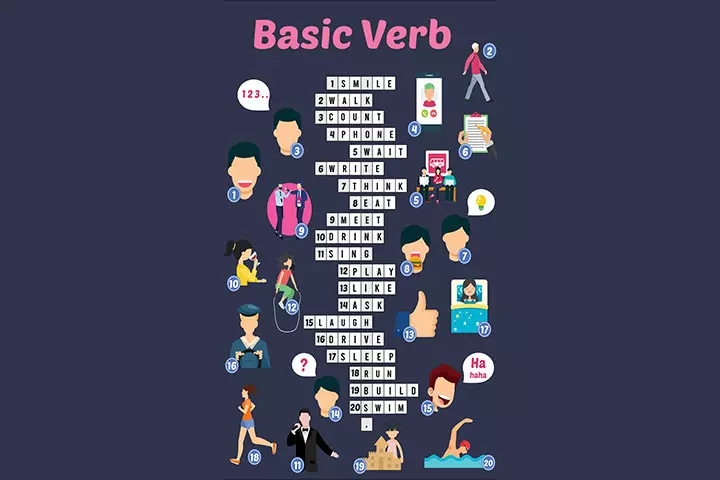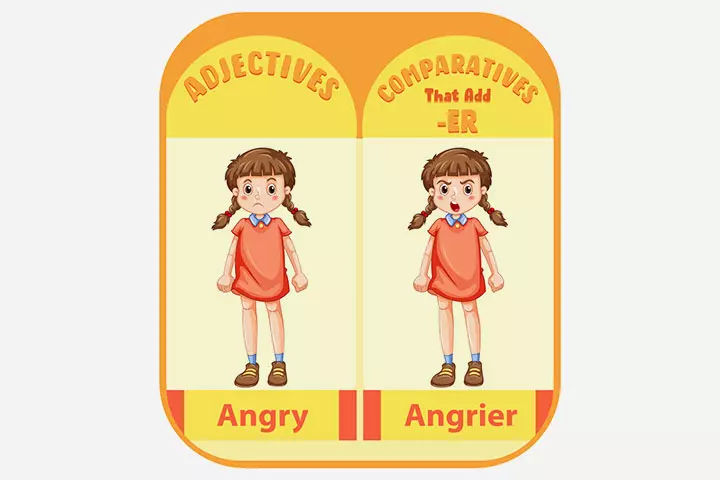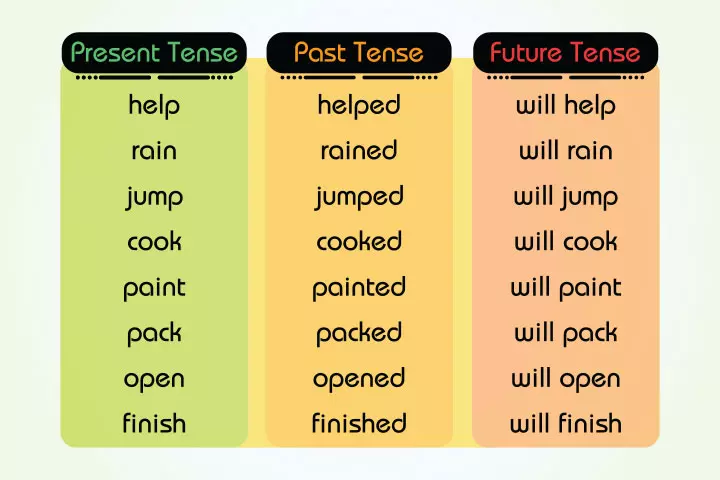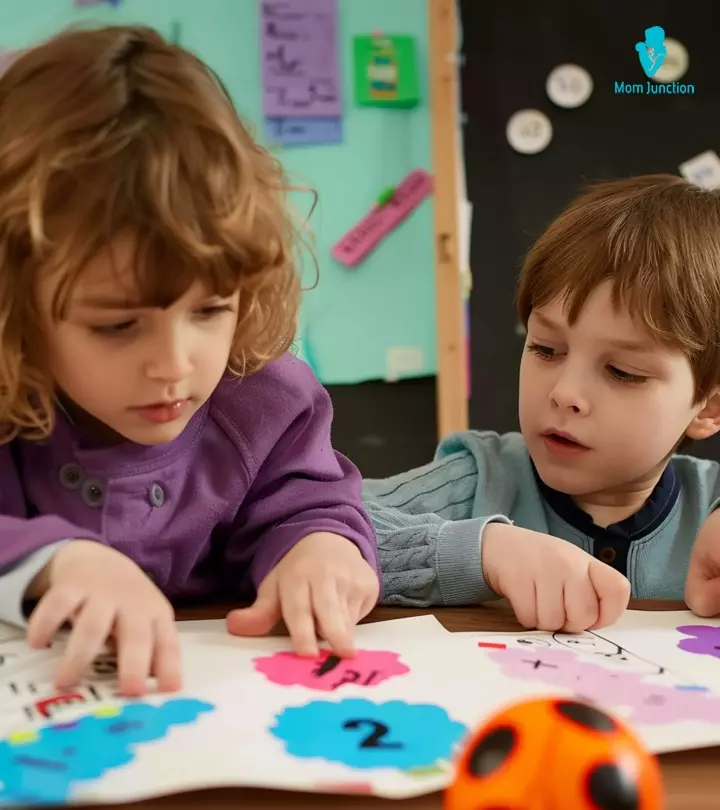
Image: Midjourney/ MomJunction Design Team
Having command over English can help your child in their studies and increase their prospects. English grammar quiz for kids is a useful way to teach your children the basics of English and get them interested in the language. Millennials are drawn to the modern lingo and have little knowledge about the grammar and usage of words. Hence, a grammar quiz tests their aptitude and improves their language skills and knowledge.

The benefits of regular quizzes are supported by research. Studies have shown that frequent quizzes can significantly improve students’ learning outcomes. For example, in one study, 70 high school students were divided into two groups: one took weekly quizzes, while the other only completed a midterm exam. The results revealed that students who participated in weekly quizzes performed better on final achievement tests compared to those without quizzes (1).
In this post, we bring you some English grammar quiz questions with answers covering all aspects of the language. These quizzes were developed to emphasize critical thinking, language development, and effective communication skills, ensuring a deeper understanding of the English language in a fun and engaging manner.
Key Pointers
- English quizzes are a fun and exciting way to introduce the fundamentals of the English language to children.
- Grammar quizzes can help to analyze the child’s proficiency in the language.
- From questions about nouns and pronouns to verbs and adjectives, you can introduce all eight parts of speech through quizzes.
- You can also include questions on vocabulary to improve their speaking skills.
- Ensure to include quiz questions appropriate for their age and cognitive ability.
Understanding English Grammar
Grammar consists of eight parts of speech — nouns, determiners, pronouns, verbs, adjectives, adverbs, prepositions, and conjunctions. It consists of structural rules and arrangement of words and phrases, governing the sentence structure and its formation (2).
Grammar can sometimes be seen as a boring subject by many students, and making it fun is the only way to learn. Deni Mazzei, a content creator, shares her experience while teaching seventh-grade students. She explains, “As a former grammar teacher myself, I know how hard it is to engage students in the subject. It sometimes seemed as though they’d made up their minds to hate it before I even had the chance to teach them!”
She continues, “I taught 7th-grade grammar for six years, and traditional grammar instruction — textbook definitions of the parts of speech, examples, usage in the sentence — did not work for my class at all. With everything so abstract, the kids couldn’t connect to the material. We became frustrated. The kids dreaded coming into class, and I began to dread teaching them… Searching for a way to connect, I tried having the kids write stories from the first-person perspective of the parts of speech. In order to do that, they had to think about the language in a different way… The result was astonishing: the kids not only started looking forward to class, but they also retained the information much more than they had before (i).”
Hence, the use of creative methods, including quizzes, can help students connect with the material in a meaningful way, ensuring that grammar becomes a tool for communication rather than just a set of rules to memorize.
It is a misconception that grammar is about rigidity or set principles. In fact, no language can have set principles, as languages and grammar keep evolving. It is not the same as it was a hundred years ago (3).
However much it changes, grammar is the foundation of language development. Thus, having sufficient knowledge of grammar is important to express and communicate efficiently.
English Grammar Quiz
Asking questions in any form, to children, can help assess their understanding of the subject, spark engagement, and encourage critical thinking. They also help children articulate their thoughts, making learning more interactive and memorable (4). Here is a challenging quiz on English grammar, with answers. Make your children answer these simple questions. Are they ready?

Image: Dall.E/MJ Design Team
Questions On Noun
A noun is a word used to identify the name of a person, place, animal or thing.
Example: Adele is an award-winning artist.
Here, the noun is Adele, which is the name of a person.
Identify the noun in the following sentences
1. I live in Amsterdam.
1. In
2. Live
3. Amsterdam
4. I
Answer:
Amsterdam
2. I visited the Eiffel Tower in Paris.
1. The
2. Paris
3. Eiffel Tower and Paris
4. Eiffel Tower
Answer:
Eiffel Tower and Paris
3. Bhutan is a beautiful country.
1. A
2. Country
3. Beautiful
4. Bhutan
Answer:
Bhutan
4. Summer is very hot.
1. Summer
2. Very
3. Hot
4. Is
Answer:
Summer
5. The moon looks so beautiful.
1. Looks
2. Moon
3. The
4. Beautiful
Answer:
Moon
6. The doctor is an expert in his field.
1. His
2. Expert
3. Field
4. Doctor
Answer:
Doctor
7. The mailman Mr. Joe was carrying postcards.
1. Mailman
2. Mr.Joe
3. Postcards
4. Mailman, Mr. Joe and postcards
Answer:
Mailman, Mr. Joe and postcards
8. Are these mangoes tasty?
1. Tasty
2. Are
3. These
4. Mangoes
Answer:
Mangoes
9. Hello Sophie! Will you play football with us as the climate is beautiful and the team is one player short?
1. Football
2. Sophie, football, climate, team, player
3. Team
4. Climate
Answer:
Sophie, football, climate, team, player
10. Mike’s birthday party at the Sheraton was a success.
1. Sheraton
2. Mike
3. Mike, party, Sheraton
4. Party
Answer:
Mike, party, Sheraton
Questions On Pronoun
A pronoun is a word used in the place of a noun in any sentence. These are used to avoid the repetitive usage of a noun in a sentence.
Example: Roger runs very fast. And Roger has won several competitions.
Roger runs very fast. And he has won several competitions.
Identify the pronoun in the following sentences
11. They were having dinner.
1. Dinner
2. They
3. Were
4. Having
Answer:
They
12. I want to sleep.
1. To
2. Sleep
3. I
4. Want
Answer:
I
13. Is that my laptop?
1. My
2. Laptop
3. Is
4. That
Answer:
That
14. Everyone is sleeping in the dorm room.
1. Sleeping
2. Dorm
3. Room
4. Everyone
Answer:
Everyone
15. We were playing scrabble.
1. Playing
2. Scrabble
3. We
4. Were
Answer:
We
16. Look at Ellen, she is a beautiful artist.
1. Beautiful
2. She
3. Ellen
4. Artist
Answer:
She
17. He is good at cricket.
1. At
2. Good
3. Cricket
4. He
Answer:
He
18. This house is mine.
1. This
2. House
3. Mine
4. Is
Answer:
Mine
19. Would you like to have coffee?
1. Coffee
2. Have
3. You
4. Would
Answer:
You
20. Did you hear that?
1. That
2. Did
3. You
4. Hear
Answer:
That
 Trivia
TriviaQuestions On Verb

Image: IStock
The verb describes an action, occurrence or happening of an act.
Example: Adam is singing.
Here, singing is the verb, which denotes an act of doing something.
Identify the verb in the following sentences
21. The monkey sat by the door.
1. Monkey
2. By
3. Door
4. Sat
Answer:
Sat
22. Jack left in a hurry.
1. A
2. Hurry
3. Jack
4. Left
Answer:
Left
23. Michelle hurt her elbow while playing.
1. Hurt
2. Elbow
3. Michelle
4. Hurt, playing
Answer:
Hurt, playing
24. Please open the door.
1. Open
2. The
3. Please
4. Door
Answer:
Open
25. She bought a new car and started taking her driving lessons.
1. Started
2. New
3. Taking
4. Bought, started, taking
Answer:
Bought, started, taking
26. Joe accepted the job offer.
1. The
2. Job
3. Accepted
4. Joe
Answer:
Accepted
27. Kelly enjoys hip-hop music.
1. Kelly
2. Hip-hop
3. Music
4. Enjoys
Answer:
Enjoys
28. We went to the grocery store and bought so many items that carrying them home became difficult.
1. Went
2. Bought
3. Carrying
4. All three
Answer:
All three
29. The accountant is calculating the expenditure for the month of February.
1. Accountant
2. Calculating
3. Month
4. Expenditure
Answer:
Calculating
30. Johnson earns a lot of money but he spends it too.
1. Earns
2. Spends
3. Earns and spends
4. Johnson
Answer:
Earns
Questions On Adverb
An adverb is a word that revises a verb, adjective, clause, phrase, preposition, or a sentence.
Example: She is usually late to the class.
Here, the adverb is usually, which is modifying the verb in the sentence.
Identify the adverb in the following sentences
31. Marcus always arrives early.
1. Arrives
2. Always
3. Early
4. Marcus
Answer:
Always
32. Their pets go everywhere together.
1. Their
2. Go
3. Together
4. Everywhere
Answer:
Everywhere
33. The little kid ran excitedly.
1. The
2. Little
3. Ran
4. Excitedly
Answer:
Excitedly
34. They ran quickly to catch the bus.
1. Catch
2. Ran
3. Quickly
4. Bus
Answer:
Quickly
35. The students had worked very hard.
1. Students
2. Worked
3. Very
4. Hard
Answer:
Hard
36. The musical concert ended abruptly.
1. Concert
2. Ended
3. Abruptly
4. Musical
Answer:
Abruptly
37. Brisk walking is a healthy exercise.
1. Brisk
2. Healthy
3. A
4. Walking
Answer:
Brisk
38. The show is starting now.
1. Starting
2. The
3. Show
4. Now
Answer:
Now
39. The dog looked at his owner curiously.
1. Dog
2. Looked
3. At
4. Curiously
Answer:
Curiously
40. The soccer team almost quit.
1. Soccer
2. Team
3. Quit
4. Almost
Answer:
Almost
Questions On Adjective

Image: IStock
Adjectives are words used to modify a noun or phrase in a sentence.
Example: The mountaintops are covered in sparkling snow.
Here, sparkling modifies the meaning of the word snow.
Identify the adjective in the following sentences
41. Ria lives in a beautiful house.
1. Ria
2. House
3. Beautiful
4. Lives
Answer:
Beautiful
42. This store has a nice collection of shoes.
1. Store
2. Collection
3. Nice
4. Shoes
Answer:
Nice
43. Linda McKenzie has five children.
1. Linda
2. Has
3. Children
4. Five
Answer:
Five
44. There were 80 chairs in the auditorium.
1. Were
2. Auditorium
3. 80
4. Chairs
Answer:
80
45. A colorful butterfly was sitting in the garden.
1. Garden
2. Colorful
3. Sitting
4. Butterfly
Answer:
Colorful
46. Only a few mangoes are remaining in the basket.
1. Basket
2. A few
3. Mangoes
4. Remaining
Answer:
A few
47. This hot and humid weather is exhausting.
1. Hot
2. Humid
3. Hot and humid
4. Exhausting
Answer:
Hot and humid
48. Sophie is a part-time worker at the salon.
1. Sophie
2. Part-time
3. Worker
4. Salon
Answer:
Part-time
49. Meera lost her brown bag.
1. Meera
2. Brown
3. Bag
4. Lost
Answer:
Brown
50. Paul tries to help homeless people.
1. Tries
2. Help
3. Paul
4. Homeless
Answer:
Homeless
 Did you know?
Did you know?Questions On Simple Tenses

Image: Shutterstock
Tenses are mainly of three types: Present, past, and future.
- The present tense expresses an action that is happening.
Example:
She is writing.
- The past tense is used to express an action that has occurred or happened already.
Example:
She wrote.
- The future tense is used to describe an action that will occur or happen in the future.
Example:
She will write.
Identify present, past, or future tense in the following sentences
51. He plays basketball every day.
1. Present
2. Past
3. Future
Answer:
Present
52. Meera will go to a concert.
1. Present
2. Past
3. Future
Answer:
Future
53. It rained heavily.
1. Present
2. Past
3. Future
Answer:
Past
54. The baby is crying.
1. Past
2. Present
3. Future
Answer:
Present
55. Dogs were barking a lot.
1. Past
2. Future
3. Present
Answer:
Past
56. The car was parked in the wrong lane.
1. Past
2. Present
3. Future
Answer:
Past
57. Kenny will visit her ailing grandfather after returning from work.
1. Future
2. Past
3. Present
Answer:
Future
Fill In The Blanks
58. The students are __________ their notes.
1. Wrote
2. Written
3. Writing
4. Write
Answer:
Writing
59. The doctor _____ out for ten minutes.
1. Go
2. Going
3. Gone
4. Went
Answer:
Went
60. The new restaurant ______ last week.
1. Open
2. Opened
3. Opening
4. Start
Answer:
Opened
Questions On Punctuation
Punctuation marks such as commas, exclamation marks, question marks, semicolons, etc., are used in a sentence to clarify the meaning of the phrase or sentence.
61. Identify the correct sentence.
1. My ATM pin number has three 8s.
2. My ATM pin number has three 8’s
3. My ATM pin number has three 8s’
4. My ATM pin number has three 8s
Answer:
1
62. Identify the correct sentence.
1. The weather is wet, and windy and unpredictable.
2. The weather is wet, windy and unpredictable.
3. The weather is wet, windy, unpredictable.
4. The weather is wet windy, unpredictable.
Answer:
2
63. Identify the correct sentence.
1. Waiting for the storm to stop, I was anxiously looking out of the window.
2. Waiting, for the storm to stop; I was anxiously looking out of the window.
3. Waiting for the storm to stop I was anxiously looking out of the window
4. Waiting for the storm to stop I was anxiously looking out of the window.
Answer:
1
64. Identify the correct sentence.
1. The table was set-knives forks candlesticks were all in their place.
2. The table was set knives, forks candlesticks were all in their place.
3. The table was set-knives, forks, candlesticks, were all in their place.
4. The table was set – knives, forks, candlesticks — were all in their place.
Answer:
4
65. Identify the correct sentence.
1. What is the name of your father’s uncle
2. What is the name of your father’s uncle?
3. What is the name of your fathers uncle?
4. What is the name of your, fathers’ uncle
Answer:
2
66. Identify the correct sentence.
1. Dont worry, every little thing is going to be alright.
2. Don’t worry every little thing is going to be alright
3. Don’t worry. Every little thing is going to be alright.
4. Dont worry, every little thing is gonna be alright
Answer:
3
67. Correct the statement with a suitable punctuation mark.
When will you return from your dance rehearsal
1. Question mark (?)
2. Exclamation mark (!)
3. Fullstop (.)
4. Comma (,)
Answer:
1
68. Correct the statement with a suitable punctuation mark.
Rosana is a self taught baker.
1. Hyphen (-)
2. Question mark (?)
3. Comma (,)
4. Semi colon (;)
Answer:
1
69. Correct the statement with a suitable punctuation mark.
Jim lives in America his sister lives in Budapest.
1. Hyphen (-)
2. Question mark (?)
3. Comma (,)
4. Semicolon (;)
Answer:
1
70. Correct the statement with a suitable punctuation mark.
I found Hensleys bag on the table.
1. Hyphen (-)
2. Question mark (?)
3. Apostrophe (‘)
4. Semicolon (;)
Answer:
3
Questions On Preposition

Image: Shutterstock
A preposition is a word used to connect nouns, pronouns, or phrases to the other words in the sentence.
Example: The cat is resting on the table.
Here, on is the preposition.
Identify the preposition in the following sentences
71. I will see you on Saturday.
1. Will
2. See
3. On
4. You
Answer:
On
72. The class will start at 9:30am.
1. The
2. Start
3. Will
4. At
Answer:
At
73. There is a bee in the room.
1. Is
2. A
3. The
4. In
Answer:
In
74. She comes from Australia.
1. She
2. Comes
3. From
4. Australia
Answer:
From
75. The dog sat by the poolside.
1. Dog
2. Sat
3. By
4. The
Answer:
By
76. What are you looking at?
1. At
2. You
3. What
4. Are
Answer:
At
77. The kids are sitting around the block.
1. Are
2. The
3. Block
4. Around
Answer:
Around
78. Can he be relied upon?
1. Can
2. Upon
3. Be
4. Relied
Answer:
Upon
79. Sherry threw the ball over the kitchen counter.
1. The
2. Over
3. Threw
4. Counter
Answer:
Over
80. This letter was written by Sarah.
1. Was
2. Written
3. This
4. By
Answer:
By
Questions On Vocabulary
Identify the synonym from the options given below
81. Listen
1. Hear
2. Quiet
3. Play
4. Whisper
Answer:
Hear
82. Relax
1. Sleep
2. Sit
3. Rest
4. Lie down
Answer:
Rest
83. Tiny
1. Small
2. Few
3. Calm
4. Lot
Answer:
Small
84. Positive
1. Optimistic
2. Negative
3. Addition
4. Neutral
Answer:
Optimistic
85. Delicate
1. Fragile
2. Strong
3. Firm
4. Indolent
Answer:
Fragile
86. Nice
1. Pleasant
2. Fortunate
3. Impartial
4. Cool
Answer:
Pleasant
87. Fast
1. Quick
2. Slow
3. Steady
4. Consistent
Answer:
Quick
Identify the antonym from the options given below
88. Polite
1. Rude
2. Crazy
3. Irritable
4. Angry
Answer:
Rude
89. Defend
1. Play
2. Attack
3. Walk
4. Jump
Answer:
Attack
90. Gloomy
1. Dull
2. Cool
3. Chilling
4. Cheerful
Answer:
Cheerful
91. Comic
1. Tragic
2. Scenic
3. Laugh
4. Loud
Answer:
Tragic
92. Noisy
1. Peaceful
2. Quiet
3. Still
4. Flowy
Answer:
Quiet
93. Timid
1. Bold
2. Violent
3. Fake
4. Vulnerable
Answer:
Bold
94. Wealth
1. Rich
2. Poor
3. Homeless
4. Luxury
Answer:
Poor
Choose The Right Spelling
95. It is _______.
1. Wndrful
2. Wonderfool
3. Wunderful
4. Wonderful
Answer:
Wonderful
96. I have a _______.
1. Tooth Ache
2. Toothace
3. Tuthach
4. Toothache
Answer:
Toothache
97. The train _______ on time.
1. Arrivid
2. Arived
3. Arrived
4. Arrevied
Answer:
Arrived
98. _________ spend most of their time on research.
1. Scientists
2. Scintist
3. Scintests
4. Scienntists
Answer:
Scientists
99. He _________ to eat.
1. Continus
2. Continuing
3. Continued
4. Continue
Answer:
Continued
100. Are you ________?
1. Surprise
2. Surprising
3. Surprisingly
4. Surprised
Answer:
Surprised
101. Businesses are having a tough time in the current market ________.
1. Scene
2. Cenario
3. Scenario
4. Scenery
Answer:
Scenario
English Grammar Quizzing Tips For Parents And Teachers
Children often fear a quiz game due to the fear of penalty or embarrassment due to an incorrect answer. Here are some tips to help parents and teachers effectively quiz students to improve their grammatical concepts in a fun and engaging manner:
- Quiz the children in an entertaining setting, such as a quiz game with teams, instead of a test setting. This will ignite their competitive spirit and facilitate learning at the same time.
- Encourage children to read more books and watch age-appropriate English movies to improve their grammar. You may also take dialogues or sentences from their favorite books and movies and make quiz questions with them to keep their interest.
- Take time to explain grammatical concepts to children when they get their quiz answers wrong. Penalties do not help in such situations, but explaining the concept will help them retain the lesson better and avoid making the same mistake twice.
- Turn around the quiz. Ask children to identify grammatical mistakes in sentences, and when they identify them correctly, ask them why. Such a quizzing technique will further solidify their basic understanding of grammar.
- Tailor your quiz questions based on the children’s reading levels. Advanced grammatical questions and vocabulary may confuse them and make them even more apprehensive about practicing grammar.
- Integrate grammar learning into everyday activities. Encourage children to spot grammatical errors in advertisements, menus, or signs during their daily activities. This will make learning practical and relatable.
- Reward their progress and celebrate small achievements, such as getting more quiz answers correct or learning a new grammar rule, to keep them motivated and confident.
Frequently Asked Questions
1. What are the 12 basic grammar rules in the English language?
The 12 basic rules of English grammar are as follows:
- Capitalization of the first word of every sentence must be followed.
- There should be subject-verb agreement in every sentence meaning that the subject and verb forms of the word should be interrelated
- Every sentence should either end with a question mark, full stop, or exclamation mark
- The presence of subject, verb, and object in the sentence in the correct word order is mandatory.
- An adjective always precedes the noun
- The proper adjective should begin with a capital letter
- ‘A’ is used with words that start with a consonant, and ‘an’ is used with words start with a vowel
- The use of active voice is preferred more than passive voice
- The subject and verb in the sentence must agree in number with each other
- Collective nouns are either treated as singular or plural
- Indefinite articles are used for countable nouns
- Use direct objects to give information to the reader
Writing games for kids can help children better grasp these grammar rules.
2. Who is the father of English grammar?
Lindley Murray is best known as the ‘Father of English Grammar.’ He was an American lawyer, writer, and grammarian famous for his grammar books widely used in schools across the US.
3. Is an English grammar quiz for kids suitable for all age groups?
An English grammar quiz explicitly designed for children may not cater to the needs and interests of individuals from different age groups. Since the questions target children’s language skills and cognitive development, they might not be as appropriate or beneficial for older individuals.
4. Why does English grammar matter?
Grammar is an important tool for effective communication, helping people express their ideas clearly and correctly in written and spoken language. Teaching and quizzing children on basic grammatical concepts from a young age helps them become better communicators and enhances their comprehension skills, ensuring academic success. Good grammar helps students sound more credible and persuasive, eventually propelling them forward in their professional careers when they grow up.
An English grammar quiz for kids is a fantastic way to bring your child closer to the beauty of language while sharpening their grammar skills. Along with quizzes, engaging in other interactive and educational activities like English learning games for kids can keep them motivated and nurture their love for the language. Reading books, listening to the radio, watching informative television shows, and communicating with others are additional tools that foster language learning. To further challenge their grammar concepts, these English worksheets for kids are an excellent option to test and improve their knowledge. These resources, combined with consistent practice, will help your child build a strong foundation in English and enjoy the journey of learning.
Test your English grammar knowledge with this fun quiz! Answer 90+ questions and see how well you know English grammar. Challenge yourself and improve your English grammar skills!
Personal Experience: Source
MomJunction articles include first-hand experiences to provide you with better insights through real-life narratives. Here are the sources of personal accounts referenced in this article.
i. You’ll never look at teaching grammar the same way.https://medium.com/adventure2learning/youll-never-look-at-teaching-grammar-the-same-way-4c18e641ba73
References
- Valeh Gholami and Mostafa Morady Moghaddam; (2013); The Effect of Weekly Quizzes on Students‘ Final Achievement Score.
https://www.mecs-press.org/ijmecs/ijmecs-v5-n1/IJMECS-V5-N1-5.pdf - Main Parts of Speech.
https://academicguides.waldenu.edu/writingcenter/grammar/partsofspeech - Types of Language Change.
https://www.ling.upenn.edu/courses/Fall_2003/ling001/language_change.html - Using Effective Questions to Engage Students.
https://teaching.cornell.edu/teaching-resources/engaging-students/using-effective-questions-engage-students
Community Experiences
Join the conversation and become a part of our nurturing community! Share your stories, experiences, and insights to connect with fellow parents.
Read full bio of Elisabeth Daly
Read full bio of Harshita Makvana
Read full bio of Deepa Thomas
Read full bio of Reshmi Das

















